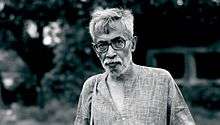Nabarun Bhattacharya
| Nabarun Bhattacharya | |
|---|---|
 | |
| Born |
23 June 1948 Baharampur (Berhampur), West Bengal |
| Died |
31 July 2014 (aged 66) Kolkata, India |
| Occupation | writer, editor, theater activist |
| Language | Bengali |
| Notable works | Herbert (1994), "Andho Biral", "Fyataru" |
| Notable awards | Sahitya Akademi Award (Bengali) |
| Relatives |
Bijon Bhattacharya (Father) Mahashweta Devi (Mother) |
Nabarun Bhattacharya (23 June 1948 – 31 July 2014) was an Indian Bengali writer who was committed to a revolutionary and radical aesthetics. He was born at Baharampur (Berhampur), West Bengal. He was the only child of actor, playwright Bijon Bhattacharya and writer, activist Mahashweta Devi.[1]
His novel, Herbert (1993), which was awarded the Sahitya Akademi Award, and adapted into a film of the same name in 2005, by Suman Mukhopadhyay.[2]
Personal life
He studied in Kolkata, first Geology, then English, from Calcutta University.[1]
In an interview, Nabarun has said that once he used to be a hardline communist but is no longer so. In response to a question regarding what he thinks to be the most prominent ideological change in him, he says "I am no longer anthropocentric".[3]
Works
Aside from fiction, he has also written poetry, of which Ei Mrityu Upotyoka Aaamaar Desh Na (This Valley of Death Is Not My Country) is an example.
The characters called Fyataru
His magic realist writings introduced a strange set of human beings to Bengali readers, called Fyataru (fyat: the sound created by kites while they are flown; otherwise, fyat has also a hint of someone worthless, deriving from the words foto, faaltu; uru: related to flying), who are an anarchic underclass fond of sabotage and are capable of flying whenever they utter the mantra 'fyat fyat sh(n)aai sh(n)aai' (This mantra was made into a song by the popular Bangla band Chandrabindoo in one of its albums[4]). They appear in his books Mausoleum, Kaangaal Maalshaat, Fatarur Bombachaak and Fyatarur Kumbhipaak and Mobloge Novel.[5] Suman Mukhopadhyay, who was basically from a theatrical background, dramatized Kaangaal Maalshaat.[6]
Major works
- Kaangaal Maalshaat (Hooghly: Saptarshi Prakashan, 2003)
- Herbert (Kolkata: Deys, 1994)
- Lubdhak (Barasat: Abhijan Publishers, 2006)
- Ei Mrityu Upotyoka Aamaar Desh Na (Hooghly: Saptarshi, 2004)
- Halaljhanda o Onyanyo (Hooghly: Saptarshi, 2009)
- Mahajaaner Aayna (Kolkata: Bhashabandhan, 2010)
- Fyaturur Kumbhipak (Kolkata: Bhashabandhan)
- Raater Circus (Kolkata: Bhashabandhan)
- Anarir Naarigyan (Kolkata: Bhashabandhan)
Death
Nabarun Bhattacharya died of intestinal cancer at Thakurpukur cancer hospital, Kolkata on 31 July 2014.[7]
References
- 1 2 Kartik Chandra Dutt (ed.) (1999). Who's who of Indian Writers, 1999: A-M. Sahitya Akademi. p. 164. ISBN 81-260-0873-3.
- ↑ Nathan Lee (10 December 2008). "Storm Advisory: Cyclone of a Life on the Horizon". New York Times.
- ↑ "Legitimate Anger". Textualities. Retrieved 6 October 2011.
- ↑
- ↑ ""Carnival-er Bisphoron" – Review of Nabarun Bhattacharya's "Kangal Malsat", by Tapodhir Bhattacharya – Parabaas Issue 35". Parabaas.com. Retrieved 6 October 2011.
- ↑ "The Telegraph – Calcutta : Metro". Telegraphindia.com. 4 March 2006. Retrieved 6 October 2011.
- ↑ "Radical Bengali writer Nabarun Bhattacharya dies at 66 – IBNLive". Ibnlive.in.com. Retrieved 31 July 2014.
External links
- "Nabarun Bhattacharya | Facebook". facebook.com. Retrieved 20 November 2016.
- "An Indian Writer in Japan : Textualities". web.archive.org. Retrieved 20 November 2016.
- American Petromax (Hindi) – Nabarun Bhattacharya